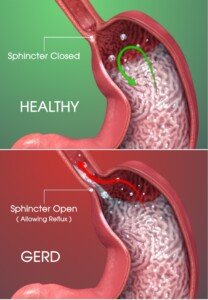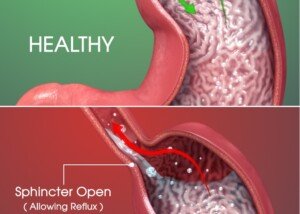Just how often must you have acid reflux from GERD (heartburn) to be at risk for esophageal cancer?
Esophageal cancer is one of the most frightening cancers to have, because its prognosis is poor in so many cases.
The disease is frequently diagnosed at an advanced stage because early symptoms can be vague or mistaken for less serious conditions.
Advanced stages of esophageal cancer often involve significant tumor growth or spread to other organs, making it harder to treat effectively.
19.2% – Number of people who are alive five years after a diagnosis of esophageal cancer, according to the National Cancer Institute Surveillance, Epidemiology and End Results Program.
As mentioned, this disease is typically discovered only after it has spread, making successful treatment very unlikely for the long-term.
There’s over 22,000 cases of new esophageal cancer diagnoses each year in the U.S., says the American Cancer Society.
People age 20 to 44 make up 2.3% of the cases, while those 65 to 74 make up 30.6%.
Heartburn, Acid Reflux
You may already know that GERD or chronic heartburn can lead to Barrett’s esophagus, which in turn is a risk factor for cancer of the esophagus.

Scientific Animations, Creative Commons/BY-SA/Attribution-ShareAlike 4.0 International
“Generally, we consider high risk for Barrett’s esophagus and subsequent esophageal cancer, those who have prolonged reflux symptoms requiring medication at least three times per week for more than five years, especially if older than 50,” explains Jonathan Zinberg, MD, chief of gastroenterology at South Nassau Communities Hospital, Oceanside, NY.
“However, new onset symptoms past the age of 50 should also be suspect and evaluated.
“Some patients with Barrett’s have few if any symptoms, so these are merely guidelines for higher suspicion.
“Those with a family history of esophageal cancer are also at a somewhat higher risk.”
If you have GERD, commonly known as acid reflux, you need to prevent Barrett’s esophagus.
Barrett’s esophagus is a condition where the lining of the esophagus changes due to chronic acid exposure, increasing the risk of esophageal cancer.
To control GERD, consider making dietary changes, such as avoiding spicy, fatty or acidic foods, and refrain from eating close to bedtime.
Elevating your chest (not just the head) while sleeping can also help reduce acid reflux by keeping stomach acids from traveling up the esophagus.
If Barrett’s esophagus is diagnosed, lifelong surveillance is necessary.
This involves regular endoscopic examinations to monitor the esophagus for any precancerous changes or abnormalities.
Don’t be afraid of an upper endoscopy. This procedure is a valuable diagnostic tool that allows doctors to examine the esophagus, stomach and the beginning of the small intestine.
An upper endoscopy is typically performed using a thin, flexible tube with a camera, called an endoscope, which is gently inserted through the mouth and into the digestive tract.
The procedure is done under sedation, so you won’t feel discomfort during the examination.
In fact, you may even completely fall asleep from the sedation during the procedure, and after what seems like only a minute or two, you’re told that the procedure is over.
If any abnormalities are found, the doctor can often take biopsies for further analysis or provide immediate treatment.


 Jonathan Zinberg, MD
Jonathan Zinberg, MD







































